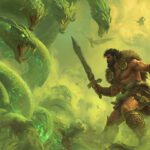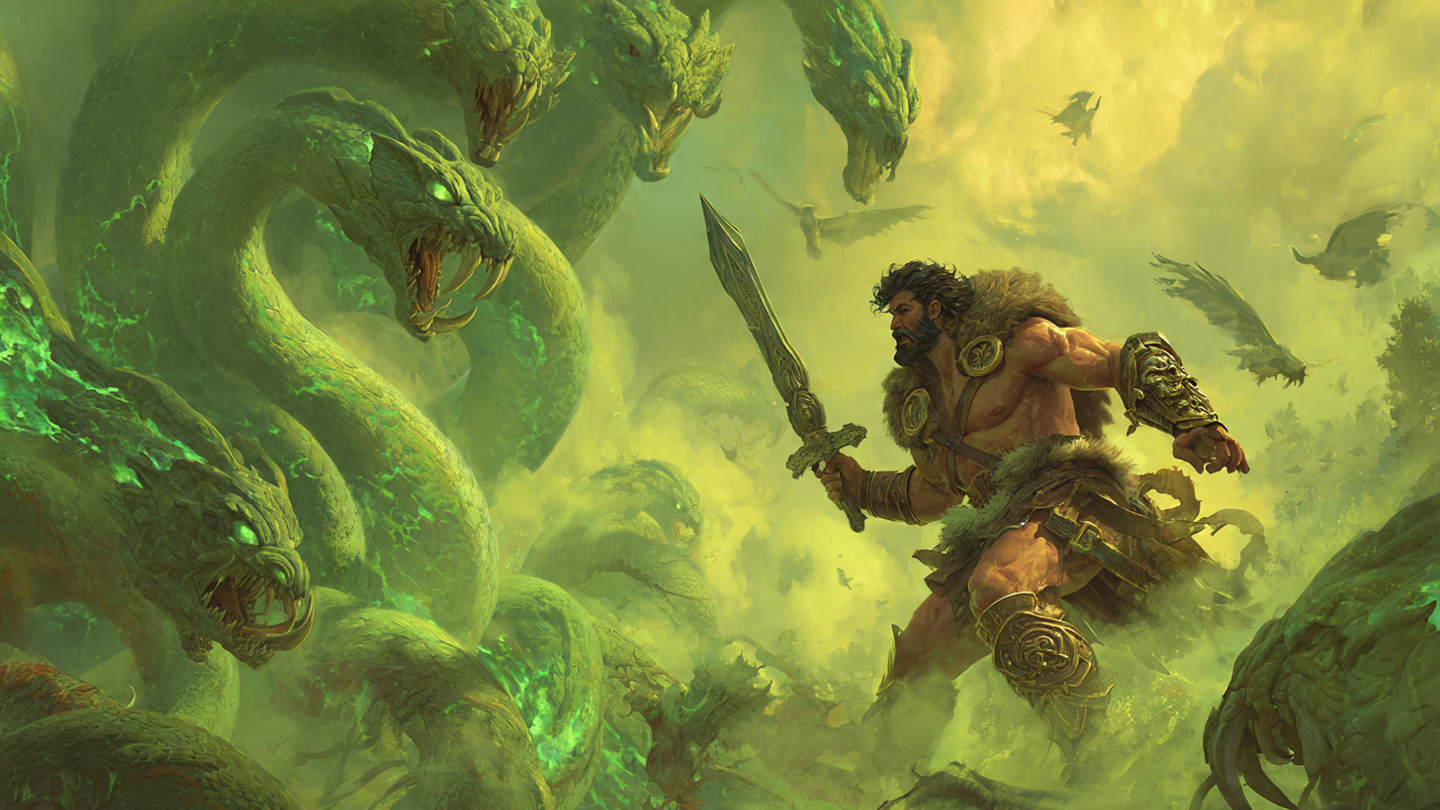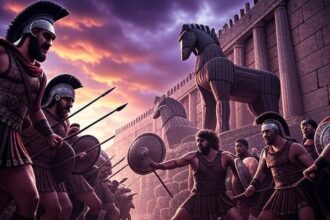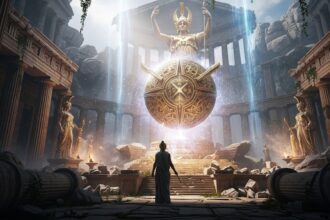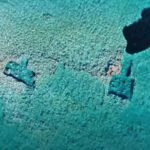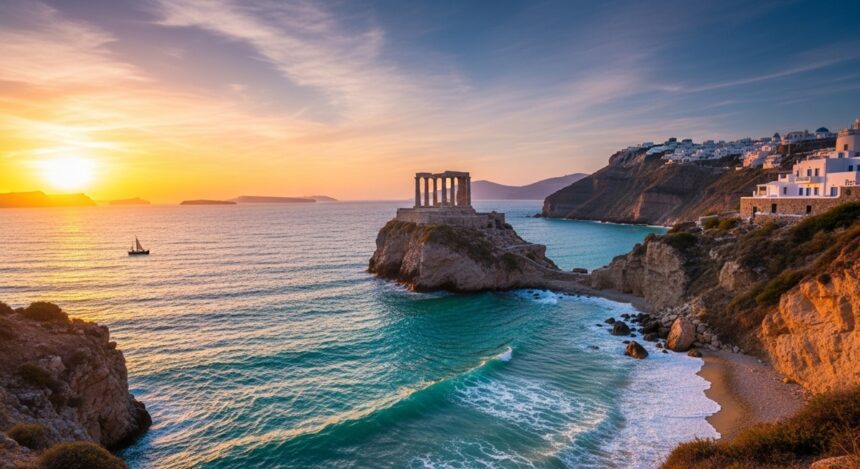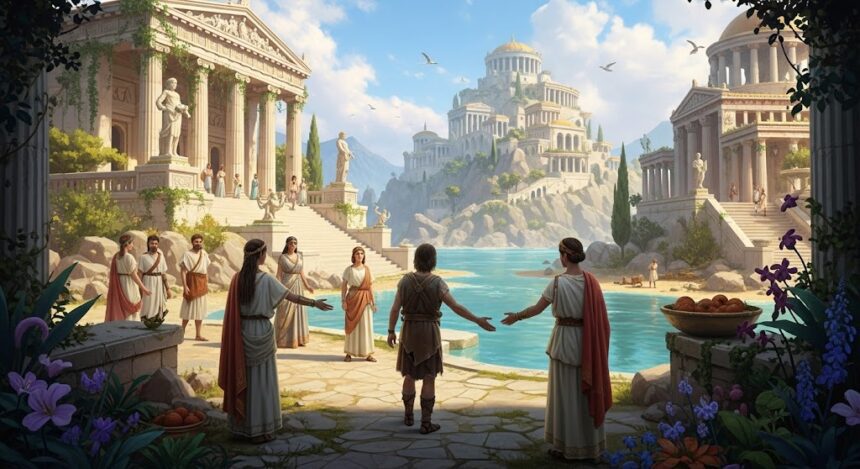The sun hung low over the Argolid, turning the swamps of Lerna into a steaming cauldron of poison and death. Hercules, still bruised from wrestling the Nemean Lion, dragged himself back to Tiryns expecting at least a nod of respect. Instead, King Eurystheus, pale and trembling inside his bronze storage jar, handed down the next command with a smirk he couldn’t quite hide. Kill the Lernaean Hydra. Everyone knew what that meant. No one had ever walked away from those marshes alive.
Eurystheus was sure this time the hero would finally break. What the king forgot was that Hercules had a habit of breaking everything except himself.
The Monster That Should Never Have Existed
Deep in the fetid heart of Lerna lurked a creature born from the worst nightmare the gods could dream up. Its father was Typhon, the hundred-headed storm giant who once chained Zeus and nearly ended the world. Its mother was Echidna, the serpent-woman whose lower half never stopped writhing. Together they spawned the Lernaean Hydra, a serpent so grotesque that even the other monsters kept their distance.
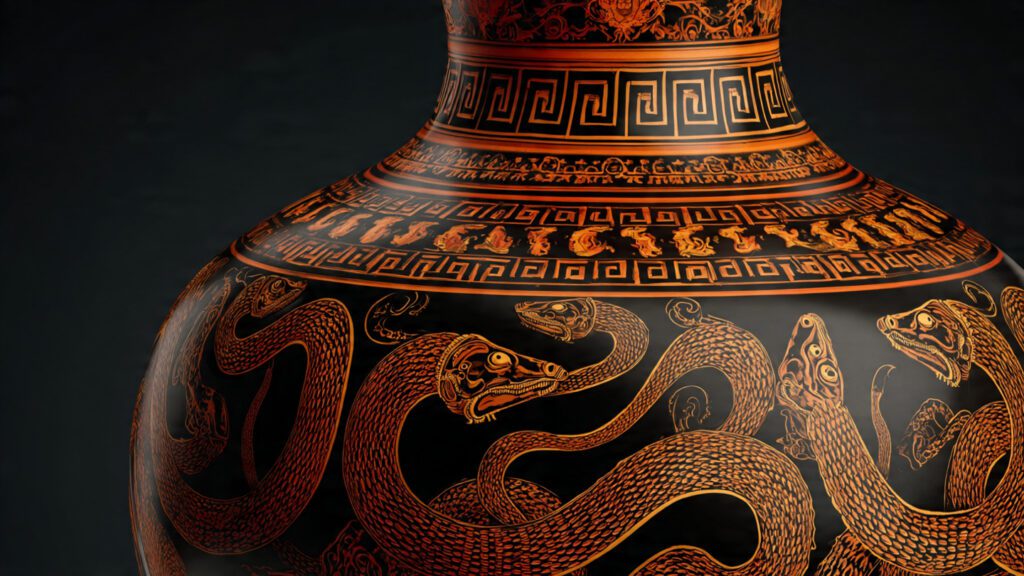
Ancient storytellers argued endlessly about the number of heads. Some swore there were nine, others insisted on fifty, and a few vase painters simply ran out of room and painted heads until the clay was full. The exact count hardly mattered. What mattered was the rule that made the beast unbeatable.
Heads That Refused to Stay Dead
Strike off one snarling head and two more erupted from the stump, angrier and hungrier than before. Blood hissed where it touched the ground, and the air around the creature shimmered with venomous mist. Birds dropped dead mid-flight. Grass blackened and curled. Any warrior brave enough to approach was already dying before he raised his sword.
Yet hidden among the writhing necks was a single golden head, the only truly immortal one. Cut that one and nothing grew back. Of course, reaching it meant surviving every other head long enough to try.
Even the Hydra’s breath was a weapon. One lungful turned lungs to ash. The swamp itself became an extension of the monster, a toxic moat no army could cross.
The King’s Perfect Trap
After the Nemean Lion ended up as a fashionable cape, Eurystheus grew desperate. Hiding inside his jar, he listened to travelers’ tales of the Hydra and felt hope for the first time since the labors began. No strength, no matter how legendary, could outpace exponential growth. Send the strongest man alive against a foe that doubled with every blow, and even Hercules had to fall.
The order was given. Hercules bowed his head, turned, and walked out without a word.
A Battle That Started Wrong and Got Worse
He took his nephew Iolaus and a chariot and rode south until the air tasted like death. Smart enough not to breathe the swamp fog any longer than necessary, Hercules stood at the edge of the mire and began shooting flaming arrows into the cave mouth.
The response was immediate. The ground shook. Water boiled. The Hydra surged out in an avalanche of scales and fangs, every head screaming at once.
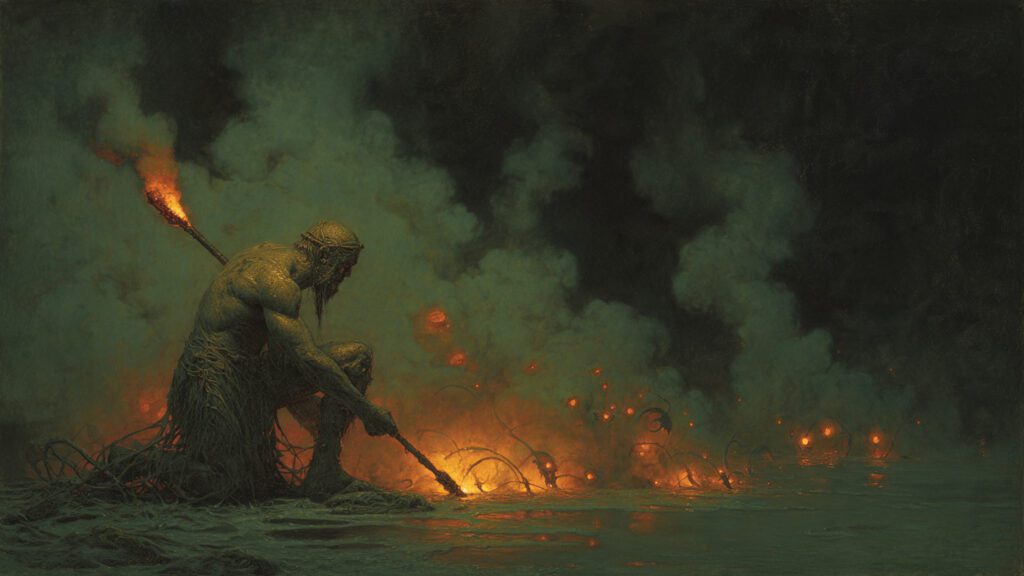
Hercules met it head-on. His club rose and fell like thunder. Heads flew, rolled, and hissed on the ground. For one brief, glorious moment it looked like raw power might actually work.
Then the stumps began to sprout.
Two heads for every one lost. Then four. Then eight. The monster grew larger with every swing. Hercules felt his arms turn heavy for the first time in his life.
Hera’s Nasty Surprise
As if multiplying heads weren’t enough, the goddess Hera decided to stack the deck. From the shallows crawled a crab the size of a war chariot, sent personally by the queen of heaven who had hated Hercules since the day he was born. Its claw clamped around the hero’s ankle like an iron trap. Pain shot up his leg. He roared, smashed the creature into red paste, but the damage was done. Precious seconds lost. Dozens more heads gained.
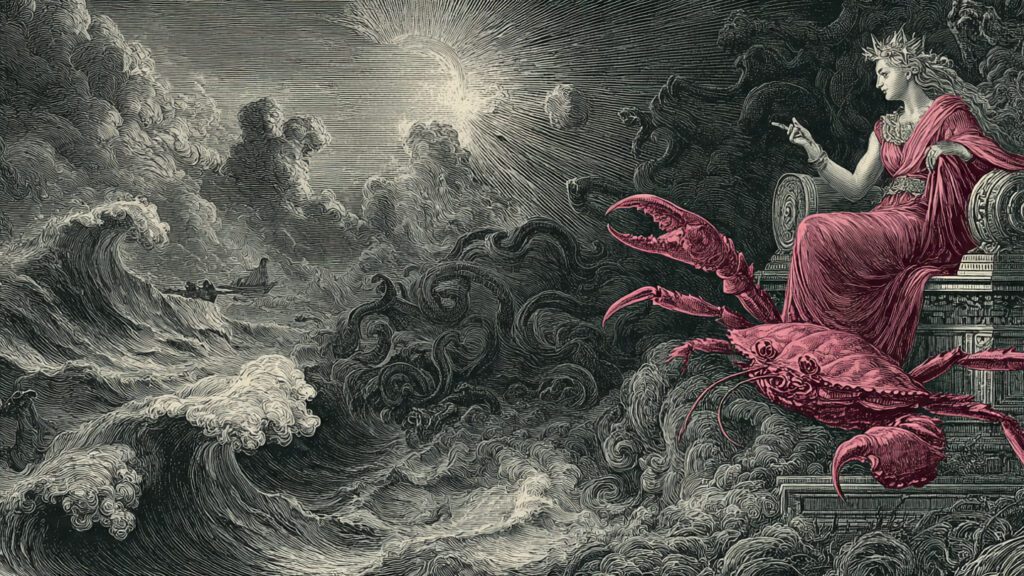
Hercules staggered. The poison in the air clawed at his throat. For the first time ever, the strongest man alive felt small.
The Moment Everything Changed
Half-blind from venom and sweat, Hercules realized brute force was feeding the monster. He needed something else. Something smarter.
He bellowed for Iolaus.
The charioteer came running with a torch. The plan was brutal and perfect. Hercules swung, severed a head, and before the stump could bleed, Iolaus pressed burning wood against raw flesh. Smoke and the stench of cooking serpent filled the air. No blood flow meant no regeneration.
One by one the necks stopped sprouting. The Hydra thrashed in panic, suddenly mortal and terrified. Hercules forced his way forward through whipping tails and snapping jaws until he reached the golden head. A single arrow ended it.
The swamp fell silent except for the hiss of dying poison.
Victory That Tasted Like Defeat
Hercules cut open the corpse and dipped his arrows in the black-green venom. Those arrows would kill countless enemies in years to come, and eventually they would kill Hercules himself, but that tragedy was still far away.

He buried the immortal head beneath a boulder so massive it supposedly still sits beside the old road to Elaius. Then, limping and half-dead, he returned to Tiryns expecting the praise he had earned twice over.
Eurystheus had other plans.
Cowering in his jar, the king declared the labor invalid. Rules were rules. Hercules had help. The feat did not count. Instead of ten labors, now there would be twelve.
The Second Labor of Hercules became the only one officially erased from the list, punished not for failure but for success achieved the wrong way.
A Word That Still Means Unbeatable Evil
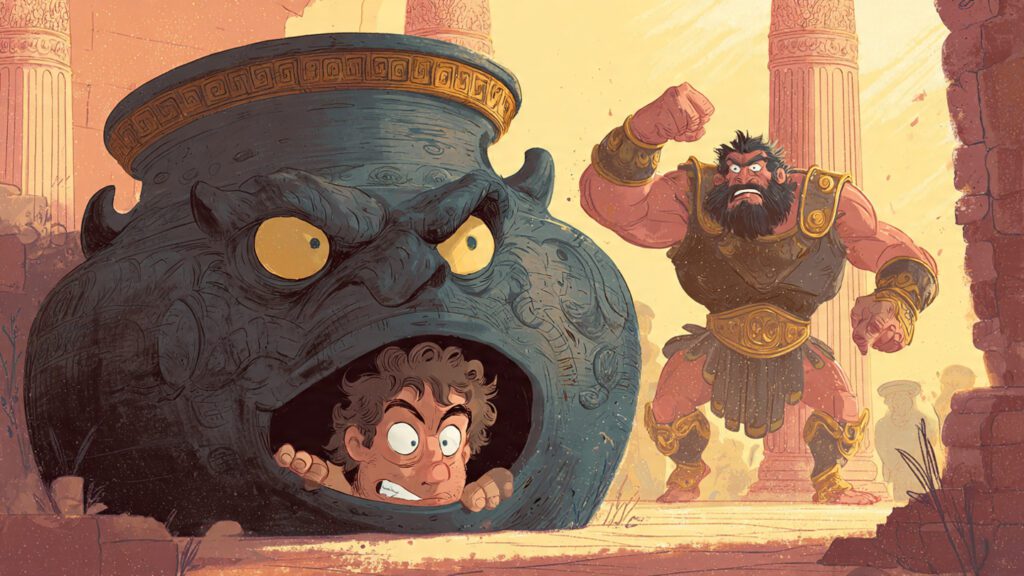
Ever since that day in the swamp, people have used the word Hydra for any problem that gets worse when you attack it the wrong way. Corrupt officials, endless wars, computer viruses, bureaucratic red tape, every one of them is called hydra-headed because a desperate hero once learned the hard way that some monsters laugh at swords.
Plato wrote about lawmakers cutting at abuses only to watch two more spring up. Modern generals mutter about hydra-headed insurgencies. Every time someone sighs that fixing one issue just creates three more, they are quoting the exact moment Hercules realized he was losing.
The lesson carved itself into human language: sometimes the hardest battles are won not by hitting harder, but by thinking differently. And sometimes the people giving the orders are the last ones to understand that.
In the end, the Lernaean Hydra did exactly what Eurystheus wanted. It nearly killed Hercules and forever changed how we talk about impossible problems. The only thing it failed to do was win.


